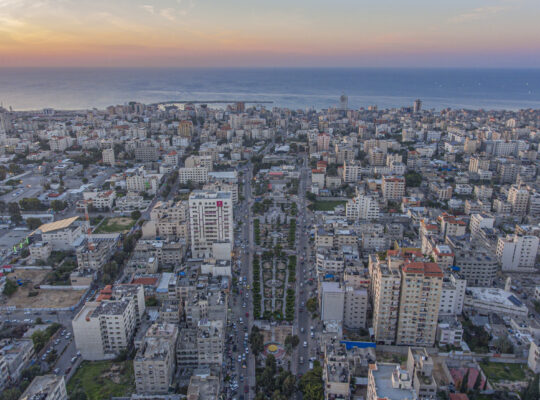Unlock the Editor’s Digest for free
Roula Khalaf, Editor of the FT, selects her favourite stories in this weekly newsletter.
The writer is an Israeli historian and author of ‘A State at Any Cost — The Life of David Ben-Gurion’
Some time before Israel celebrated its 75th Independence Day in May, I went to the Mount of Olives in Jerusalem to visit my father’s military grave. He was killed in 1948 during the first Arab-Israeli war, when I was three years old. The Jewish cemetery on the Mount of Olives has existed for about 3,000 years; my father’s grave overlooks a majestic panorama of the Judaean desert, descending to the Dead Sea.
A few steps away I noticed the graves of two Israeli children murdered in the Gaza Strip in 1971. Marc-Daniel Aroyo was about seven, his sister Abigail about five. Both were born in London. The Palestinian terrorist who threw a grenade into the family’s car was around 15. I came down from the cemetery thinking of what David Ben-Gurion, Israel’s first prime minister, said about Gaza before the 1956 Suez campaign: “If I believed in miracles, I’d wish for it to be swallowed up by the sea.”
The slaughter of more than 1,400 Israelis by Hamas on October 7 brought to mind what Ben-Gurion said in 1919 about the Jewish-Palestinian conflict: “There is no solution. We want Palestine to be ours as a nation. The Arabs want it to be theirs — as a nation. I don’t know what Arab would agree to Palestine belonging to the Jews.” His conclusion was that the conflict can at best be managed, not solved.
The displacement of most Arabs from at least part of Palestine has always been a fundamental part of Zionist ideology. Under Ben-Gurion, over half a million Palestinian Arabs became refugees and were never allowed to return. I feel a partner to the historical responsibility for at least some of the Palestinian “Nakba”, as they call their national tragedy. Not many Israelis do.
Israel’s presence in the Palestinian territories occupied in 1967 marks a continuation of the Zionist enterprise there, beginning at the end of the 19th century. The Palestinian population has been subjected to brutal oppression and daily violations of their human rights. But in more than 100 years since Ben-Gurion’s grim analysis, the management of the conflict has never been more catastrophic than under prime minister Benjamin Netanyahu. Hoping to divide the Palestinian leadership between rival groups, Netanyahu encouraged Hamas to take over Gaza. He will probably be held responsible also for the army’s failure to detect in time the offensive plans of Hamas.
The attack on Israel marked the country’s worst day since 1948. The atrocious evidence found at the scene, including remains of children burnt alive, evoked memories of the Holocaust. Government and public opinion reacted by calling for massive retaliation aimed at the “elimination of Hamas”. Soon, more recent chapters of the conflict came to mind. In 1956 foreign minister Golda Meir justified harsh military action against the population in Gaza as punishment for a murderous attack on Israeli civilians.
“I freely admit that I don’t have any bad feelings about it,” Meir told the cabinet. “I am not saying that because in Gaza Arab children were killed and here we are talking about Jewish children, but because we did not start it. They need to know that they need to pay, and pay a high price.”
Some Israeli television commentators urged the launch of a second Nakba. Indeed, it seemed for a while that Netanyahu was failing to distinguish between primeval instincts of revenge and calculated strategy. More than 1mn residents of Gaza were “encouraged” to leave their homes. The city was subjected to ruinous air raids. An Israeli ground operation is said to be imminent. US president Joe Biden issued a timely warning to Israel “not to be blinded by rage”, but also repeated the usual call for a “two-state solution”. It is an old diplomatic fiction, needed to preserve a glimmer of false hope.
Following this conflict from war to war since my childhood, I sometimes thought the worst still lay ahead. Perhaps both we and they had not yet suffered enough, and only a catastrophe of biblical proportions could break the deadlock. At times I was too optimistic; I can’t rule out that my pessimism now might also be excessive. In fact, the war has not yet reached its full dimensions and no clear outcome is in sight.
I wish that, rather than a second Nakba, it would breed a second Entebbe, the airport in Uganda where in 1976 Israeli commandos rescued more than 100 hijacked passengers. An Israeli commander, Yonatan Netanyahu, was killed in action. He was the present premier’s elder brother. It was one of Israel’s finest hours. Even finer would be an immediate ceasefire and exchange of the hostages held by Hamas for Palestinian prisoners held in Israel.
Source link



